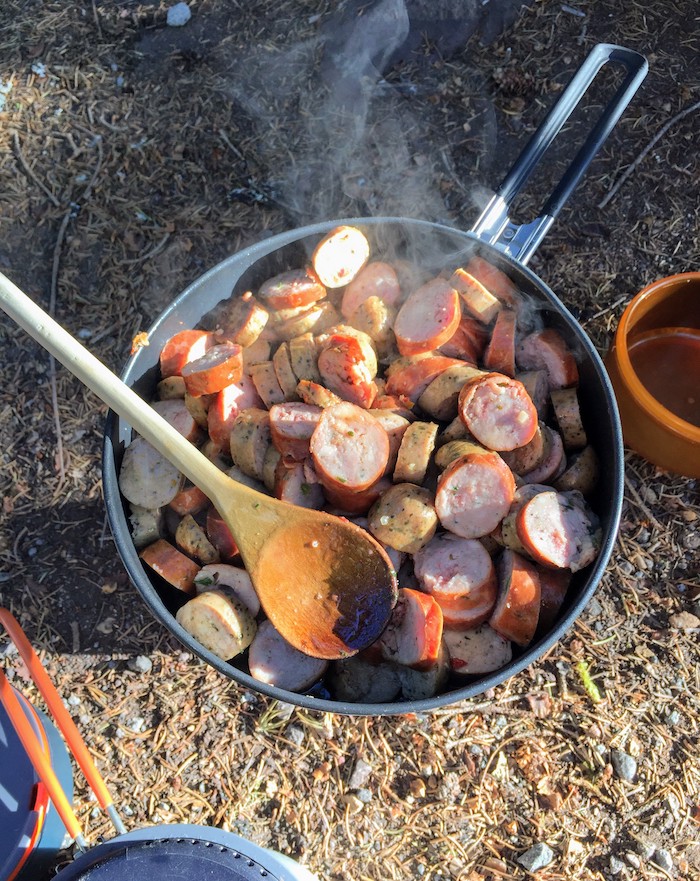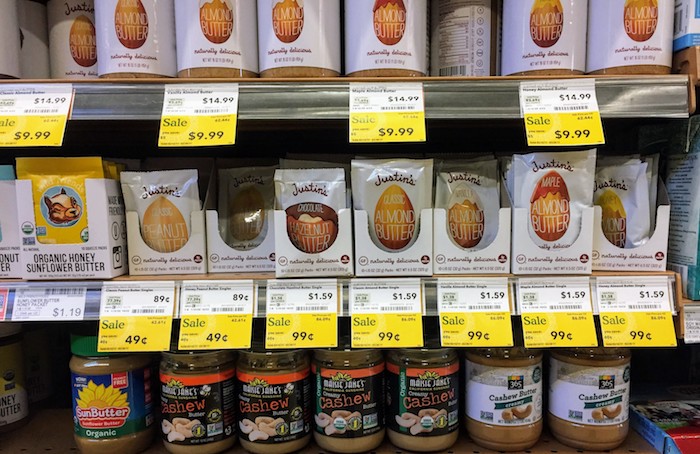April 4, 2018
Have you carefully planned your protein intake for your upcoming long backpacking trip or thru-hike? Maybe not… Well, here are four reasons why you should. Then learn what your protein needs are.
Note: This blog post contains affiliate links. You can read my disclosure here.
4 reasons why you should pay attention to proteins
Proteins are not just for weightlifters
Muscles adapt to the training you are doing. When you accumulate the miles, your body wants to increase its capacity to produce energy from nutrients and oxygen so that hiking at a given pace becomes easier. All of that is possible thanks to the mitochondria in your muscles, which are made of … proteins! In short, proteins help your muscles to adapt to the exercise you are doing so that you become better at it.
Losing weight maybe but not muscles!
Losing weight is very common among thru-hikers, but you probably don’t want all this weight to come from muscle loss! Many, if not all, thru-hikers lose some weight while on the trail. The energy expenditure increases from:
1) hiking all day compared to more sedentary occupations
2) living in the outdoors, often cold temperatures
3) being exposed to high elevations (depending on where you hike)
4) having to carry a big pack.
These increased energy needs make it often difficult to consume enough calories to avoid losing weight. Maybe you are happy to get rid of a few pounds or kilos, but have you thought that this weight loss could be caused by loss of muscles rather than fat mass? Yeap, your body, will use mostly muscle mass to compensate for its lack of energy intake rather than fat mass. The way to prevent losses of muscles? Proteins!
There is nothing worse than being sick on the trail
Seriously, there is nothing fun about being sick at home, but on the trail, it is worse! Eating enough proteins to keep your immune system up and running (all these white blood cells are made of proteins!) can only help to prevent being sick.
What if this small injury never gets better?
Being out in the woods and hiking day after day with a pack can lead to injuries. Fortunately, most are minor such as blisters and small cuts but can be very annoying if they don’t heal properly. Solution? Proteins!
What are your protein needs?
Ok, now that you are even more aware of the importance of protein needs for distance hikers, how much do you need? Instead of giving an estimate of proteins/day, I prefer to talk about an optimal spread throughout the day. Why? Well, the protein metabolism science has evolved over the years and giving daily protein needs hardly make sense anymore.
A bit of protein metabolism first
Proteins within our body are extremely dynamic, continuously being broken down into their constituents (amino acids) and resynthesized from the available pool of amino acids (Burke, 2015). To keep a pool of amino acids available, you need to consume sufficient proteins throughout the day.
So how much protein does that mean?
The optimal protein intake that would stimulate the protein synthesis is about 0.3 g/kg (or 0.4 if you are in an energy deficit, which is likely during long hiking) or 20-30g per meal/snacks for most adults. The key to stimulating protein synthesis is to consume protein often during the day, about five to six eating opportunities per day with ~ 25g. That means about 125-150g/day (5-6 x 25 g). Obviously, you’ll need to adapt this to your body size. If you weigh 120 lbs (54.5 kg), your needs are closer to 5-6x 20g. If you weigh 200 lbs (90.9 kg), your needs are more like 5-6x 30g.
Here is an example of meal planning
This example of menu displays how to spread your protein intake (6 x ~25g) throughout the day.
| Meal/Snack | Foods | Proteins (g) | Energy (calories) |
|---|---|---|---|
| Breakfast | Raspberry and Cocoa Nibs Oatmeal | 27.5 | 675 |
| Snack 1 | 6 Orange and Chocolate Protein Balls | 28 | 432 |
| Snack 2 | 1 large tortilla wrap with 2 Individual Packages of Justin’s |
20 | 630 |
| Snack 3 | 1/2 cup of dried fruit + 3oz of Turkey Jerky | 34 | 420 |
| Snack 4 | 1.5 cup of Trader Joe's Happy Trekking trail mix |
24 | 960 |
| Dinner | Indian Lentil Curry | 22.5 | 855 |
| TOTAL | 160 | 3972 |
This menu represents only a generic example and might not meet your specific needs. If you need specific advice for a particular condition or trip, please reach out to me.
Need more ideas?
Check out this table with some of my favorite high-protein foods for the trail.
| Foods | Serving Size | Proteins (g) | Energy (calories) | Protein (g) / weight (g) |
|---|---|---|---|---|
| Textured Vegetable Protein (TVP) |
1/2 cup (48g) | 24 | 160 | 0.5 | Freeze Dried Chicken |
3/4 cup (34g) | 25 | 170 | 0.7 | Freeze Dried Edamame Veggie Snack |
1 bag (20g) | 8 | 90 | 0.4 |
| Dehydrated Whole Eggs |
1/4 cup (26g) | 12 | 154 | 0.5 |
| Powdered Peanut Butter |
2 tbsp (12g) | 5 | 50 | 0.4 |
| Skim milk Powder |
1/3 cup (23 g) | 8 | 80 | 0.3 |
| Whole Milk Powder |
1/4 cup (30g) | 7 | 160 | 0.2 |
| Light Tuna |
1 pouch (74g) | 17 | 70 | 0.2 |
What are your favorite high-protein foods? Leave comments below to share with fellow hikers.
Gen Masson, MSc, RD, CD, CSSD
Reference: Burke, L. D., V. (2015). Clinical Sports Nutrition (5th ed.): McGraw-Hill Education (Australia) Pty Ltd.



